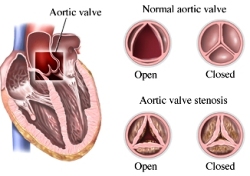What is Aortic Stenosis? How to manage it? What are the precautions to be taken? What are the signs and symptoms? What is the cause of this disease? How to treat it? How can homeopathy help you? All of this answered, in this post and of course our doctors always there to help you. Just fill in your details in the form down below and we will answer all your questions for FREE!

What is aortic valve stenosis?
Aortic stenosis or aortic valve stenosis as the name indicates the narrowing of the aortic valve of the heart. The aorta is the main artery carrying out oxygenated blood out of the heart. When blood enters the aorta from the heart’s left ventricle it passes through the valve known as the aortic valve. Narrowing of the aortic valve, when a passage of blood flow through valve decreases this condition is termed as aortic stenosis.
When aortic valve is obstructed, the heart needs more energy to work harder to pump blood to other parts of the body. With time this extra work by the heart limits the amount of blood it can pump and may weaken the heart muscle, and leading to symptoms such as fatigue and dizziness.
What are the factors which leads to the aortic stenosis?
Following are the risk factors which leads to the aortic stenosis:
-A deformed aortic valve- in some individuals they are born with a congenital narrowed aortic valve or develop aortic valve stenosis later in life because they were born with a bicuspid aortic valve with two flaps instead of three.
-Age-Aortic valve stenosis risk increase with age and the buildup of calcium deposits on heart valves.
-Previous rheumatic fever- Rheumatic fever can lead to stiffness of flaps and fuse, with time which leads to aortic valve stenosis.
-High blood pressure.
-High cholesterol.
-Type 2 diabetes.
-Smoking.
The other causes which can lead to the formation of aortic stenosis are as follows:
-Age-related progressive calcification of a normal aortic valve.
-Calcification of a congenital bicuspid aortic valve.
-Post-inflammatory to acute rheumatic fever.
-Hyperlipoproteinemia.
-Uremia.
What are the symptoms of the aortic stenosis?
-Chest pain (angina) or tightness.
-Shortness of breath.
-Feeling faint or fainting with exertion.
-Fatigue, especially during times of increased activity.
-Heart palpitation- a sensation of a rapid, fluttering heartbeat.
Heart murmur.
-Pulsus alternans.
-Systolic murmur.
Heart failure can occur due to aortic stenosis and following symptoms will appear
-Fatigue.
-Shortness of breath.
-Swollen ankles and feet.
Is aortic stenosis life threatening?
Yes, aortic stenosis is life threatening.
Does aortic stenosis cause fatigue?
Aortic stenosis weakens the heart due to which shortness of breath, fatigue and swelling of lower limbs occur.
Is aortic stenosis heart failure?
Aortic stenosis may leads to the heart failure because in aortic stenosis abnormal narrowing of aortic valve is there, and if the degree of narrowing becomes significant to prevent/delay the flow of blood from left ventricles to the arteries, heart problem occurs.
What are the complications of aortic stenosis?
-Chest pain (angina).
-Fainting (Syncope).
-Heart failure.
-Irregular heart rhythms.
-Cardiac arrest.
-stroke-blood clot.
What are the investigations to diagnose aortic stenosis?
Following tests are helpful to diagnose aortic stenosis:
-Serum electrolytes level.
-Cardiac Biomarkers.
-Complete blood count.
-Electrocardiography- Serial ECG can demonstrate the progression of aortic stenosis.
-Chest radiography.
-Cardiac catheterization.
-Coronary angiography.
-Radionuclide ventriculography.
-Exercise stress testing.
What is the treatment of aortic stenosis?
Surgical procedures help in treating aortic stenosis. Therapies to repair or replace the aortic valve includes:
-Balloon valvuloplasty.
-Aortic valve replacement.
-Transcatheter aortic valve replacement.
-Surgical valvuloplasty.
Homeopathic treatment for aortic stenosis?
Homeopathic medications manage symptomatically and the medicines are as follows:
-Cactus
-crategus
-naja
-Digitalis
-rauwolfia
For more information, you can visit WebMD and eMedicine.





